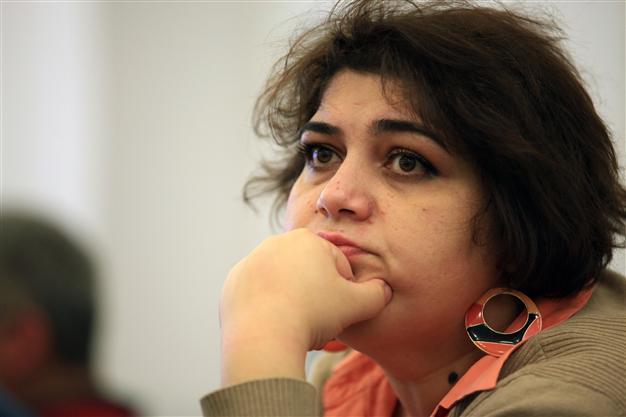Azerbaijan jails top journalist for seven and a half years
BAKU - Agence France-Presse

AP photo
Azerbaijan on Sept. 1 sentenced award-winning investigative journalist and anti-graft campaigner Khadija Ismayilova to seven and a half years in jail on corruption charges she denounced as trumped-up, her lawyer said.Considered Azerbaijan's most prominent critical journalist, Ismayilova, 39, served as bureau chief for the local service of the US-funded Radio Free Europe/Radio Liberty network between 2008 and 2010.
"Baku's Court for Serious Crimes sentenced Khadija Ismayilova to seven and a half years in prison for economic crimes, including illegal entrepreneurship and tax evasion," her lawyer Fariz Namazly told AFP.
"We will appeal the illegal verdict," he added.
Held in pre-trial detention since December, Ismayilova had denounced her prosecution as politically motivated and an attempt to stop her critical reporting.
The journalist has fearlessly probed the alleged vast riches amassed by President Ilham Aliyev and his family, which have ruled Azerbaijan with an iron fist since it gained independence in 1993.
In her final statement to the court on Monday, Ismayilova vowed the authorities "won't be able to force me to stay silent, even if they sentence me to 15 or 25 years".
Ismayilova's mother Elmira Ismayilova, who was present in the courtroom on Sept. 1, told AFP: "Khadija said she is strong enough to bear everything as she fights for a right cause."
Ismayilova has long been a thorn in the side of Azerbaijan's leaders.
In a leaked diplomatic cable from 2009 published by WikiLeaks, Aliyev is said to have described her as an "enemy of the government", asking the US ambassador to intervene to have her sacked by Radio Liberty.
In December, Azerbaijani police raided and closed the Baku offices of Radio Liberty in a move that Washington called deeply disturbing, aggravating concerns about the treatment of non-state media in the Caucasus nation.
In 2012 Ismayilova said she was the victim of blackmail, after a covertly-filmed video with sex scenes purportedly involving her was posted on the Internet.
Rights groups said the footage was released by supporters of Aliyev in retaliation for Ismayilova's work exposing his daughters' alleged business interests.
The US State Department urged the government to release Ismayilova, saying that the case was "another example in a broad pattern of increasing restrictions on human rights" in the country.
EU foreign affairs chief Federica Mogherini and Commissioner Johannes Hahn said "the trial raised fundamental questions on the impartiality of the court and the legality of the accusation" and called for the case to be reviewed.
Council of Europe chief Thorbjoern Jagland, meanwhile, asked Baku to furnish the evidence justifying why Ismayilova was jailed and repeated European concerns that activists, journalists and regime critics were being targeted.
Rights groups have accused the government of Azerbaijan of stepping up pressure on opponents after Aliyev's reelection for a third term in 2013.
Last month, a prominent Azeri couple that campaigns against human rights abuses was sentenced to lengthy jail terms in a case that was also decried as politically motivated.
The high-profile trials kicked off after Azerbaijan in June hosted with great fanfare the inaugural edition of the European Games, a sporting extravaganza billed as Europe's answer to the Olympics.
Freedom House says there are now more than 80 political prisoners in Azerbaijan.
Aliyev, 53, strongly denies accusations of rights abuses, while his administration has dismissed such criticism as a smear campaign.
Human Rights Watch called Ismayilova's jailing "outrageous" and said it "shows the Azerbaijani authorities' willingness to subvert the law to exact revenge against critics".
"Her conviction and sentence should be immediately set aside," the group's executive director Kenneth Roth, said in a statement.
Denis Krivosheev of the Amnesty International rights watchdog was equally scathing, saying it was "yet another unfair trial relying on fabricated charges."
"Ismayilova's only crime was to investigate high-level government corruption with courage and persistence," said Johann Bihr, the head of Eastern Europe and Central Asia desk at the Reporters Without Borders media advocacy group.
















